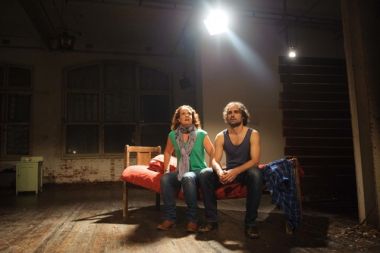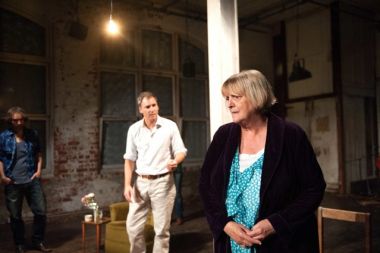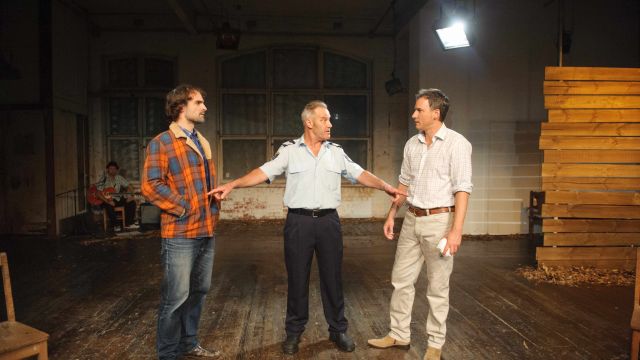Boy Out of the Country
There is an age-old debate that floats around in theatre circles – and the topic is playwrights directing their own plays. Directorial instinct is entirely different to a writer’s, an actor’s and a designer’s. It’s like the difference between a parent and a guardian; well might you behave like a parent, but the child will never truly be yours. It doesn’t change the nature of the extent of your ability to nurture, protect and care, but it certainly changes the circumstances – of which truth, honesty and respect are paramount. But the levels of responsibility are the same.
In a vibrant, independent creative democracy, the relationship between a writer and a director is crucial. And if ever there was an example of how the involvement of a director and a dramaturg might have made a difference to the effectiveness of a new Australian play, it is this work (to call it a play almost does it a disservice).
Brothers Gordon (Matt Dyktynski) and Hunter (Martin Blum) have been arrested brawling by local policeman Sergeant Walker (Christopher Bunworth). Hunter has returned to the country town where he and Gordon grew up. While Hunter has been ‘away’, Gordon has remained sharing an aspirational life with his wife Rachael (Amanda LaBonte) and their two young daughters. The boys’ mother Margaret (Jane Clifton), drifts in and out of denial about the extent to which her life is changing, having been pensioned off into a flat as Gordon prepares the family estate for a lucrative sub-division.
 Mr Nobis’s writing is a particular kind of brilliant, and it is not difficult to see why this work attracted the stellar cast it has. Throughout the performance, I was constantly reminded of the great Dorothy Hewett, whose Man from Mukinupin at the MTC in the early 80s remains one of the highlights of my theatre-going life. In those days, it was not about how much blood could be smeared all over the walls and the floors or how much confetti could fall from the flies. It was about a new passion for the status of language in the theatre, of which Hewett, et al, were pioneers. What Nobis does, and superbly, is spur on the discussion about the power and importance of language in our theatres as opposed to the effects. And there are two scenes when it works absolutely. The first is when Clifton’s Margaret and LaBonte’s Rachael meet across the stage to tell of very similar experiences, but from different times and places. The other is when Gordon and the damaged Hunter play out a similar scene as brothers recalling their childhood Utopia. It was during both these scenes that Nobis’s play took flight with an astonishing and deeply-affecting depth and breadth.
Mr Nobis’s writing is a particular kind of brilliant, and it is not difficult to see why this work attracted the stellar cast it has. Throughout the performance, I was constantly reminded of the great Dorothy Hewett, whose Man from Mukinupin at the MTC in the early 80s remains one of the highlights of my theatre-going life. In those days, it was not about how much blood could be smeared all over the walls and the floors or how much confetti could fall from the flies. It was about a new passion for the status of language in the theatre, of which Hewett, et al, were pioneers. What Nobis does, and superbly, is spur on the discussion about the power and importance of language in our theatres as opposed to the effects. And there are two scenes when it works absolutely. The first is when Clifton’s Margaret and LaBonte’s Rachael meet across the stage to tell of very similar experiences, but from different times and places. The other is when Gordon and the damaged Hunter play out a similar scene as brothers recalling their childhood Utopia. It was during both these scenes that Nobis’s play took flight with an astonishing and deeply-affecting depth and breadth.
Nobis’s command of ‘vernacular verse’ is faultless, and when it doesn’t work in performance, it is because there is a layer of influence over the performance that is missing – and that is essentially directorial. The fundamentals of blocking are universally abandoned, and what we’re left with is too many comings and goings and far too much standing and sitting around. Near-fatally, it is this lack of creative intelligence in the directorial vision that constantly suffocates the extraordinary potential of the script.

Dyktynski, Blum, Clifton, LaBonte and Christopher Bunworth as the local cop, are some of Melbourne’s finest actors, and their embrace of this script and the characters was superb. Sowinksi’s design was spare and functional, while Mr Mango Cools’ performance on guitar of his original composition was limited but effective. It started to make me uncomfortable watching him sitting upstage left (not an unimportant position at 45 Downstairs) silent and inactive for the better part of the night. Why he was onstage all night while the actors kept wandering on and off remains a mystery.
Ultimately, this is a rich, rewarding and often very funny night at the theatre. While it has its faults, it also marks the arrival of a fascinating, daring and original new voice in our theatre, which is cause for celebration.
Geoffrey Williams
Images (from top): Martin Blum, Chris Bunworth and Matt Dyktynski; Amanda Labonte and Martin Blum, & Martin Blum, Matt Dyktynski and Jane Clifton. Photography by Sarah Walker.
Subscribe to our E-Newsletter, buy our latest print edition or find a Performing Arts book at Book Nook.

